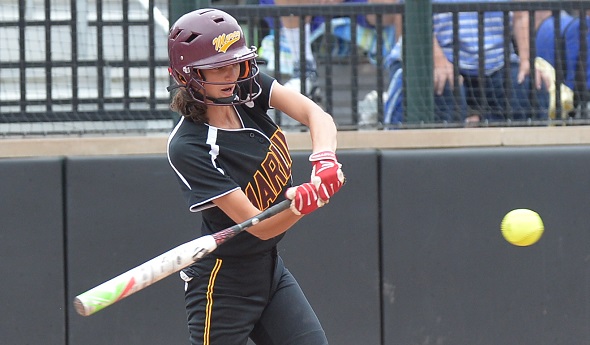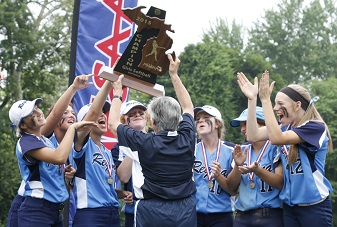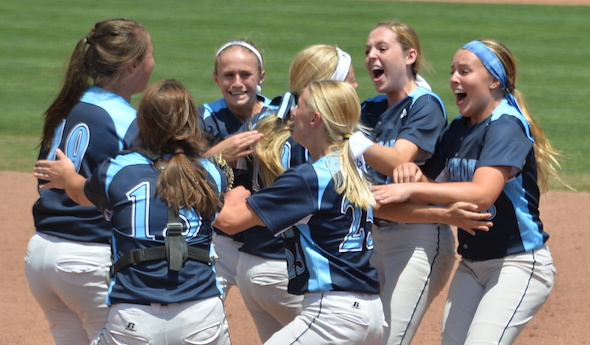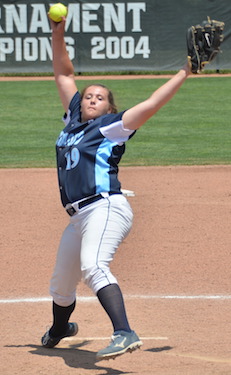
Detroit Powers Succeed Amid Lower Numbers
By
Tom Markowski
Special for Second Half
April 20, 2016
Participation in spring sports, following a similar decline in student-aged population in Michigan, has been on a decline statewide over the last decade.
 But while some like baseball have experienced a slight bounce-back over the last few seasons, softball in particular has seen its numbers continue to fall.
But while some like baseball have experienced a slight bounce-back over the last few seasons, softball in particular has seen its numbers continue to fall.
Coaches and administrators in the Detroit area point to a number of factors intertwined that produced a snowball-like effect – and now it seems to have come to a head.
Three softball programs in the Catholic League Central, a division that competes at a high level statewide, don’t have sufficient numbers to field a junior varsity this spring. Many programs don’t sponsor freshmen teams for the same reason.
But for schools like Birmingham Marian, Farmington Hills Mercy and Livonia Ladywood not to have a junior varsity softball team is quite shocking to some – especially considering that Mercy enters this season ranked No. 3 in Division 1 and Ladywood is No. 2 in Division 2.
Specialization fallout
Marian athletic director Dave Feldman isn’t among those stunned. He saw this coming. Feldman points to the 2007-08 school year when the Michigan High School Athletic Association was forced, by court decision, to switch the volleyball season from the winter to the fall and the girls basketball season from the fall to the winter.
Feldman has a daughter, a freshman at Marian, who participated on the junior varsity volleyball team this fall. When that season was over she joined a club volleyball team. Feldman said the club volleyball season begins in December and continues on into June.
“It’s not AAU,” Feldman said. “But you need to be an AAU member (to play). They play all of the time. Heck, they played on Easter Sunday. And every club is filled.”
The pressure on athletes to play year-round is arguably greater now than it ever has been, and can come from coaches, peers and family – based on a frequent misconception that if athletes want to earn a scholarship, they better keep up with the Joneses or be left behind.
Feldman said he’ll back his daughter with whatever decision she makes. If she wants to play volleyball nine or 10 months a year, he’ll support that. But Feldman said, financially, it’s getting out of hand. He estimated between the cost of airfare, hotels and meals that he’ll spend $6,500 in support of his daughter playing club volleyball.
And, according to Feldman, the increase in attention on volleyball is affecting participation in other sports.
“(Girls) basketball is fighting for its life,” he said. “Our field hockey program (a fall sport) is fine. Our lacrosse teams are fine.
“We have 15 playing volleyball at all three levels. We had 16 (total) try out for softball and we made two cuts. We haven’t had a JV the last two years. The last time we had a freshman (softball) team was in 2004 or 2005. The last few years the numbers have dropped off. It’s the specialization.”
Simply signs of change?
Warren Regina is another member of the Catholic League Central. Regina athletic director Diane Laffey also is the head coach for softball and basketball, and she said she thinks lacrosse has drawn some athletes away from softball – which makes sense, although the total number of girls playing high school lacrosse in Michigan has increased only about 1,000 over the last decade, while softball participation is down 4,000 athletes over the same time.
One should not use Regina as an example of decline – Laffey’s team won the Division 1 championship last spring and fields a softball team at all three levels. At the same time, Regina also has seen a rise in participation in lacrosse. There are 18 playing for both the varsity and junior varsity this spring, the highest participation in school history.
Mercy varsity softball coach Alec Lesko said, simply, that times have changed. Mercy reached the Division 1 Semifinals last season, just as Ladywood did in Division 2 the year before – yet despite this success, Mercy’s number of softball players also has declined.
 “(The students) have many more options,” Lesko said. “In addition to their school work there’s band, theatre, honors society clubs. In the past kids would play three sports and be in the band. All of my daughters were multi-sport athletes. By their sophomore year they had to make a decision (on which sport they would concentrate).
“(The students) have many more options,” Lesko said. “In addition to their school work there’s band, theatre, honors society clubs. In the past kids would play three sports and be in the band. All of my daughters were multi-sport athletes. By their sophomore year they had to make a decision (on which sport they would concentrate).
“It’s also economics. They want to earn a scholarship. You hear horror stories about (the cost of) student loans. Even the big schools have trouble getting the (students to play softball).
“As far as college, and I can only speak about softball, the Big Ten coaches want the player they recruit to play other sports,” Lesko added. “I hope to have a JV program next year. A player that misses 30 JV games, we will feel that crunch later. There are those who think JV softball is a waste of time, that you should just compete in travel (during the summer). We will get some of those kids. Those who compete in travel then come to us as sophomores.”
Reasons for optimism
Don Peters is the softball coach at Clarkston, and between coaching travel and at the high school level he’s put in 35 years. He coached travel before taking over the Clarkston program. Peters said the two complement each another, or at least they should.
“I know some disagree,” he said. “The girls have a lot of choices in the spring. Look at all of the sports they can play. I don’t think lacrosse has cut into the numbers. Not yet, but it’s probably going to. We haven’t been affected. We have 45 (covering three teams) in our program. We really push softball in our community because it’s been established.”
Peters said coaches in softball and baseball need to make the game enjoyable, and one way is to reward those who chose to participate by playing them on a regular basis. A student who is No. 14 or 15 on a squad often will play once a week and, with all of the options available, isn’t willing to put in the practice time for limited game action.
Mercy senior first baseman Abby Krzywiecki played a variety of sports before her freshman year. It was then she decided that softball would be her main sport and she chose to pour all of her energy into it.
She said it’s not all gloom and doom for her sport.
“We had a small freshmen class (last year),” she said. “When I came in we had a large class. It was one of the biggest. It’s not that we’re not getting softball players. In the travel world, it’s becoming more intense. We have more younger people playing. The sport is getting more intense. The talent level is getting higher.”
 Tom Markowski is a columnist and directs website coverage for the State Champs! Sports Network. He previously covered primarily high school sports for the The Detroit News from 1984-2014, focusing on the Detroit area and contributing to statewide coverage of football and basketball. Contact him at [email protected] with story ideas for Oakland, Macomb and Wayne counties.
Tom Markowski is a columnist and directs website coverage for the State Champs! Sports Network. He previously covered primarily high school sports for the The Detroit News from 1984-2014, focusing on the Detroit area and contributing to statewide coverage of football and basketball. Contact him at [email protected] with story ideas for Oakland, Macomb and Wayne counties.
PHOTOS: (Top) A Farmington Hills Mercy hitters prepares to connect during last season's Division 1 Semifinal against Caledonia. (Middle) Warren Regina coach Diane Laffey hoists her team's championship trophy after the Saddlelites downed Caledonia in the Final last spring.

Richmond Follows Freshman into History
June 18, 2016
By Bill Khan
Special for Second Half
EAST LANSING — The pitching circle is Erin Shuboy's comfort zone.
It doesn't matter if it's an MHSAA championship game against a team with a .433 batting average and a full set of bleachers on either side of her.
Pitching is easy for Shuboy.
Talking about it? That's when the nerves start to show.
"I'm so overwhelmed," the freshman pitcher told a group of reporters after throwing a no-hitter in Richmond's 2-0 victory over Vicksburg in the MHSAA Division 2 championship game on Saturday at Michigan State University.
When one more reporter joined the scrum around Shuboy, she exclaimed, "Oh, my gosh! There's more!"
She'd better get used to the attention, because she has three more years of dealing with interview requests in high school, and possibly beyond that in college.
"She feels like she doesn't have anything to say," said freshman catcher Kennedy Caperton, who has been playing softball with Shuboy since elementary school. "Once you get to know her, she opens up. I think she's just in shock about it."
Shuboy pitched the 14th no-hitter in an MHSAA Final, the first since Mattawan's Lauren Gevaart had one in the 2011 Division 1 title game. Shuboy struck out seven, facing the minimum of 21 batters.
The only runner she allowed was pitching counterpart Avery Slancik, who walked with one out in the second inning. A grounder by Olivia Holmes forced out Slancik's courtesy runner, Lauren Goertler, at second base. Holmes was then caught stealing by Caperton to end the inning.
"As soon as I let go of it, I was like, 'I hope this is good,'" Caperton said.
Shuboy retired the last 16 batters she faced. Even though the scoreboard told the story, she had no clue she'd thrown a no-hitter until a reporter told her while walking from the field to the awards area.
"We had to slow her down several times," Richmond coach Howard Stuart said. "Even the officials were telling us to slow her down. She was in such a hurry to get the ball and throw it. There was no mention of a no-hitter; not one word was said. Even at the end of the game, she didn't know. She was so focused. The team was not allowed to say anything to her."
Richmond's two runs came in the top of the fourth inning. Lindsay Schweiger led off with a single to left, then moved to third when the throw to first went into the outfield on a bunt by Allison Swantek.
Shuboy delivered the first run with a slow groundout to second base.
 "I just wanted to make contact with it," Shuboy said. "That's all we had to do, get the RBI."
"I just wanted to make contact with it," Shuboy said. "That's all we had to do, get the RBI."
Swantek made it 2-0 when she raced home on a wild pitch.
"We made a couple of mistakes," Vicksburg coach Paul Gephart said. "Those couple of mistakes all happened together, and that led to the couple of runs."
Vicksburg went down in order in the final five innings, striking out six times, but putting three balls in the outfield. The final out came on a foul ball down the right field line.
"The few solid hits we had went right at them," Gephart said. "One of our quicker girls, they were playing way up to take away the bunt option we've used in the past. You have to give them all the credit. They're a good team. They wouldn't be here if they weren't."
It was Richmond's first MHSAA softball championship after losing in the Finals in 1985, 1998 and 1999. The Blue Devils (32-9) had reached the Semifinals seven times prior to this season under Stuart, who is 954-288 in 38 years at the helm.
Shuboy broke down when asked what it meant to help deliver a title to Richmond's six seniors.
"I just wanted to help them out," she said. "I'm gonna cry. I just wanted them to have a good end of their senior year, and a state championship would be a perfect way."
One of those seniors, Schweiger, knows that the program is in good hands with Shuboy and Caperton returning for three more years as the team's battery.
"Erin handled it so well," Schweiger said. "She could be put in tough situations and play fantastic. Kennedy can throw people out like it's nothing. She's amazing at catching. They work so well together, because they've been playing with each other since they were little; all of us have, basically. They'll be good next year, too."
Slancik allowed six hits, struck out eight and didn't give up a walk for Vicksburg (36-9). She kept the game close by getting out of jams in the fifth and seventh innings after Richmond moved runners to third base.
PHOTOS: (Top) Richmond players rush to celebrate their MHSAA Final win with pitcher Erin Shuboy (19). (Middle) Shuboy prepares to unload a pitch during Saturday’s championship game.

